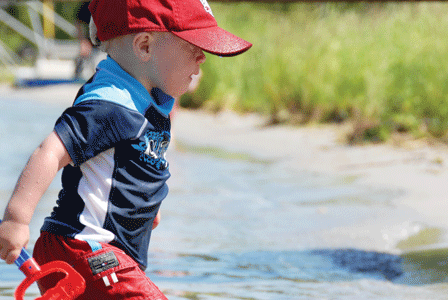
As seasonal temperatures rise, so do heat-related health risks. So to stay safe and enjoy summer, take the following steps to prevent heat-related illnesses.
During winter, when the thermometer plunges below zero, who hasn’t dreamed of basking in summer heat? But as seasonal temperatures rise, so do heat-related health risks.
Luckily, you don’t have to hide from the sun. You can stay safe and enjoy summer by paying attention to heat and humidity and recognizing danger signs.
Overheating equals trouble
Heat-related illnesses occur when your body heats up faster than it can cool itself. According to the Office of Occupational Health and Safety at the University of Windsor, when your internal temperature rises above 38 C (100.4 F), your brain begins to overheat. Your body’s cooling system shuts down, sweating stops, and your internal temperature climbs rapidly. Symptoms such as fatigue, dizziness, and muscle cramps are your body’s way of telling you it’s in trouble. It’s important to listen.
Working or playing in high heat and humidity is a common cause of heat stress. But overheating can also occur in small, enclosed areas such as cars, tents, or hot tubs.
Know your risks
The youngest and oldest among us are most vulnerable. Infants and children up to age four are extremely sensitive to high temperature and depend on you to keep them cool and hydrated. The elderly are less likely to sense temperature change and may not recognize heat-related problems in time to relieve their symptoms.
Heat-related illnesses can strike anyone regardless of age or physical condition. So be careful, particularly at the beginning of summer when you haven’t yet had a chance to become acclimatized to the warmer weather.
There are many more factors that increase the risk of heat-related illness:
- dehydration
- fever
- excess body weight
- excess alcohol or caffeine consumption
- certain medications for high blood pressure, diabetes, and other conditions
- lack of sleep
- eating disorders
- chronic illness
- previous heat stroke
Take precautions
You can’t control the temperature, but you can control your environment and your actions. Firstly, it’s wise to check with your health practitioner if you take medication, in case it makes you more vulnerable to the heat.
Here are some other easy measures you can take that may mean the difference between enjoying summer’s heat and collapsing from it.
Dress for heat
- Wear lightweight, light-coloured, loose-fitting clothing that allows sweat to evaporate.
- Wear a wide-brimmed hat that protects your forehead and the back of your neck.
- Use an umbrella for shade.
- And, of course, use sunscreen; sunburn causes overheating and fluid loss.
Seek cooler climes
- Keep windows and blinds closed during the day. Open them at night when the outdoor temperature cools down. Use window fans to speed up cooling.
- Limit daytime outdoor activity or exercise to early morning and late afternoon when the sun isn’t as strong. If you must go out, stay hydrated and take frequent rests in shady areas.
- Seek relief in an air-conditioned mall or movie theatre. During an extreme heat wave your municipality may open a cooling centre where you can find refuge.
Make friends with fluids
- The more you sweat, the more you should drink—from one cup to one litre per hour, depending on your activity level.
- Avoid alcohol, caffeine, or sugary drinks, which lead to dehydration.
- Don’t wait until you’re thirsty, but don’t chugalug or you’ll upset your body’s salt balance.
- Speak to your health practitioner if you are taking diuretics or limiting fluid intake because of health conditions.
- Consult with your health practitioner before taking salt replacement pills.
Stay cool
- Take cool baths or showers.
- Apply cool compresses.
Keep an eye on others
- Never leave children, the elderly, or animals alone in parked cars. During hot summer weather, it takes as little as 20 minutes for heat inside a car to rise almost 20 degrees. Cracking open a window will not provide adequate air flow.
- Check on elderly parents, friends, or neighbours regularly, especially if they’re housebound.
|
Heat-related illnesses Heat cramps Causes: excessive sweating depletes your body of salt. Heat cramps can occur when you drink too much water without sufficient salt replacement. Treatment: move to a cool area. Massage and stretch the muscle. Provide sips of cool, salted water—1/4 to 1/2 tsp (1 to 2 mL) salt to 4 cups (1 L) water—or an electrolyte-replacement drink. If cramps continue for more than an hour, consult a health practitioner. Heat exhaustion Symptoms: heavy sweating, cool skin, thirst, fatigue, nausea, vomiting, weak pulse, rapid breathing, body temperature over 38 C (100.4 F), blurred vision. Cause: fluid loss combined with inadequate water and salt replacement causes your body’s cooling system to break down, resulting in a rapid rise in Treatment: move to a cool area. Loosen or remove excess clothing, and give cool, salted water. To dissipate body heat, mist with cool water, then fan. If symptoms persist or worsen, seek medical attention. Heat stroke Symptoms: hot, dry, red skin; severe headache; nausea; confusion or odd behaviour; body temperature above 41 C (105.8 F); fast pulse; loss of consciousness; convulsions. Cause: the body has lost its water and salt reserves and is unable to regulate internal temperature. It can develop suddenly or follow heat exhaustion. Treatment: while waiting for medical help, cool the person rapidly by fanning, spraying with cool water, or covering with wet compresses. If conscious, give sips of cool water. Do not immerse the person in cold water, as overcooling restricts blood flow and interferes with brain function. |




























